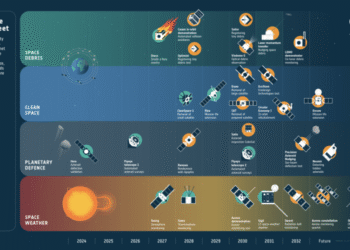The UK Space Agency has released a Monitoring & Evaluation review of its International Bilateral Fund (IBF), outlining early evidence on economic impact and the progress made in building global partnerships across the space sector. Published on 26 August 2025, the analysis positions the IBF as a complement to the UK’s long-standing engagement through the European Space Agency (ESA) by addressing a funding gap for collaborations beyond ESA frameworks. The documents are available via the UK government portal: International Bilateral Fund Monitoring & Evaluation.
What is the IBF?
The IBF is the UK Space Agency’s first programme specifically designed to establish and strengthen bilateral and multilateral partnerships with international counterparts. It targets collaborations where UK organisations can co-develop capabilities, accelerate commercial opportunities and increase global market access outside of ESA channels.
Partner geographies
The programme focuses on a mix of priority and opportunistic partnerships:
- Priority countries: United States, Canada, Australia, Japan
- Partners of opportunity: Singapore, United Arab Emirates, India, Bahrain
Objectives assessed
The Monitoring & Evaluation work examines progress against three core objectives:
- Build stronger relationships with priority countries and position the UK as a trusted partner of choice
- Increase UK space-sector inward investment and exports
- Develop UK capabilities through collaboration with international partners
Evaluation approach and documents
The UK Space Agency commissioned know.space to deliver Monitoring & Evaluation and benefits management for the IBF. The released materials include:
- Impact and economic evaluations (HTML and PDF)
- Annex to the final evaluation report (HTML and PDF)
These documents provide a structured assessment of programme effectiveness, economic additionality and the quality of emerging international relationships, helping stakeholders understand where the IBF is creating value.
Why it matters for the UK space sector
By broadening formal collaboration beyond ESA, the IBF is intended to give UK companies, universities and research organisations more direct routes to international partners, test facilities, demonstration opportunities and new markets. Strengthening bilateral ties can support increased exports, attract foreign investment and accelerate capability development in areas such as Earth observation, satellite communications, in-orbit services and space-enabled applications. Establishing the UK as a reliable counterpart in key regions also has strategic value for supply-chain resilience and mission collaboration.
What’s next
Monitoring and benefits management activities are ongoing to track progress against objectives and inform programme decisions. The latest updates, including the full evaluation materials, are available via the UK government link: International Bilateral Fund Monitoring & Evaluation. Stakeholders across industry and academia can use these findings to align partnership plans, identify potential collaborators and understand how the IBF is being directed to maximise impact.






















